Translate
Saturday, January 26, 2013
Smart Goal
My goal to be accepted into a four year college and major in computer graphics. My number one choice would be UC Irvine. After graduating, I would like to attain a job as a digital effects artist for movies. I would also like to pursue water polo in college and make the travel team.
Wednesday, January 23, 2013
Lit terms 6-30
6. Analogy- a comparasin between two things to show the similarities.

7. Analysis- a method in which a work or idea is separated into its parts, and those parts given rigorous and detailed scrutiny.

8. Anaphora- a device or repetition in which a word or words are repeated at the beginning of two ore more lines, phrases, clauses, or sentences.

9. Anecdote- a very short story used to illustrate a point.

10. Antagonist- a person or force opposing the protagonist in a drama or narrative.

11. Antithesis- a balancing of one term against another for emphasis or stylistic effectiveness.

12. Aphorism- a terse, pointed statement expressing some wise or clever observation about life.

13. Apologia- a defense or justification for some doctrine, piece of writing , cause , or action; also apology.

14. Apostrophe- a figure of speech in which an absent or dead person, an abstract quality, or something inanimate or nonhuman is addressed directly.
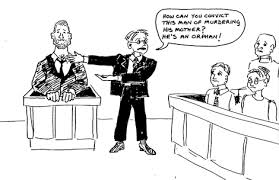
15. Argument- the process of convincing a reader by proving either the truth or the falsity of an idea or proposition; also, the thesis or proposition itself.

16. Assumption- the act of supposing, or taking for granted that a thing is true.
I assume that this is fake.

17. Audience- the intended listener or listeners

18. Characterization- the means by which writer reveals a character's personality.
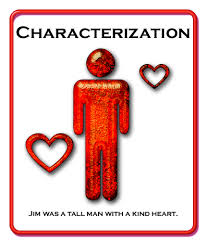
19. Chiasmus- a reversal in the order off words so that the second half of a statement balances the first half in inverted word order.

20. circumlocution- a roundabout or evasive speech or writing, In which many words are used but a few would have served.

21. Classicism- art, literature, and music reflecting the principles of ancient Greece and Rome: tradition, reason, clarity, order, and balance
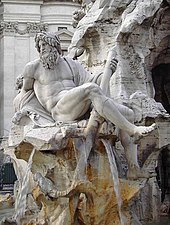
22. Cliché- a phrase or situation overused within society..

23. Climax- the decisive point in the narrative or drama; the pint of greatest intensity or interest at which plot question is answered or resolved.
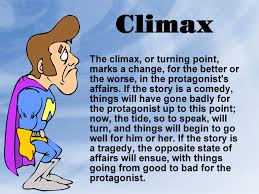
24. Colloquialism- folksy speech, slang words or phrases usually used in informal conversation.
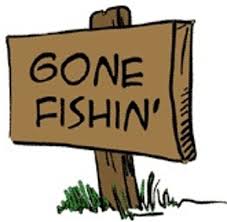
25. Comedy- originally a nondramatic literary piece of work that was marked by a happy ending; now a term to describe a ludicrous, farcical, or amusing event designed provide enjoyment or produce smiles and laughter.
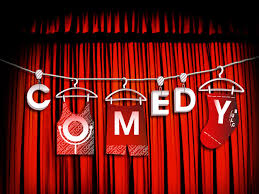
26. Conflict- struggle or problem in a story causing tension

27.Connotation- implicit meaning, going beyond dictionary definition
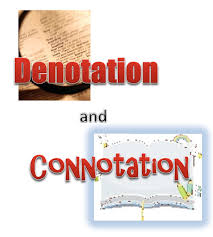
28.Contrast- a rhetorical device by which one element (idea or object) is thrown into opposition to another for the sake of emphasis or clarity.

29.Denotation- plain dictionary definition
See 27. ^
30.Denouement- loose ends tied up in a story after the climax, closure, conclusion.


7. Analysis- a method in which a work or idea is separated into its parts, and those parts given rigorous and detailed scrutiny.

8. Anaphora- a device or repetition in which a word or words are repeated at the beginning of two ore more lines, phrases, clauses, or sentences.

9. Anecdote- a very short story used to illustrate a point.

10. Antagonist- a person or force opposing the protagonist in a drama or narrative.

11. Antithesis- a balancing of one term against another for emphasis or stylistic effectiveness.

12. Aphorism- a terse, pointed statement expressing some wise or clever observation about life.

13. Apologia- a defense or justification for some doctrine, piece of writing , cause , or action; also apology.
14. Apostrophe- a figure of speech in which an absent or dead person, an abstract quality, or something inanimate or nonhuman is addressed directly.
15. Argument- the process of convincing a reader by proving either the truth or the falsity of an idea or proposition; also, the thesis or proposition itself.

16. Assumption- the act of supposing, or taking for granted that a thing is true.
I assume that this is fake.

17. Audience- the intended listener or listeners

18. Characterization- the means by which writer reveals a character's personality.
19. Chiasmus- a reversal in the order off words so that the second half of a statement balances the first half in inverted word order.
20. circumlocution- a roundabout or evasive speech or writing, In which many words are used but a few would have served.

21. Classicism- art, literature, and music reflecting the principles of ancient Greece and Rome: tradition, reason, clarity, order, and balance

22. Cliché- a phrase or situation overused within society..

23. Climax- the decisive point in the narrative or drama; the pint of greatest intensity or interest at which plot question is answered or resolved.
24. Colloquialism- folksy speech, slang words or phrases usually used in informal conversation.
25. Comedy- originally a nondramatic literary piece of work that was marked by a happy ending; now a term to describe a ludicrous, farcical, or amusing event designed provide enjoyment or produce smiles and laughter.
26. Conflict- struggle or problem in a story causing tension
27.Connotation- implicit meaning, going beyond dictionary definition
28.Contrast- a rhetorical device by which one element (idea or object) is thrown into opposition to another for the sake of emphasis or clarity.
29.Denotation- plain dictionary definition
See 27. ^
30.Denouement- loose ends tied up in a story after the climax, closure, conclusion.
Tuesday, January 15, 2013
Lit Terms 1-5
1. Allegory-
In my opinion, this is an allegory of Christmas. It is showing a "tail" tale of how North America wants more and more and is pushing out of their boundaries which is consuming them in darkness. South America area is content with what they have which is why they are golden.

2. Alliteration-
An angry alligator ate an apple at an airport.
3. Allusion-

4. Ambiguity-
Nobody knows why Mona Lisa is smiling and people have different interpretations of her facial expression.
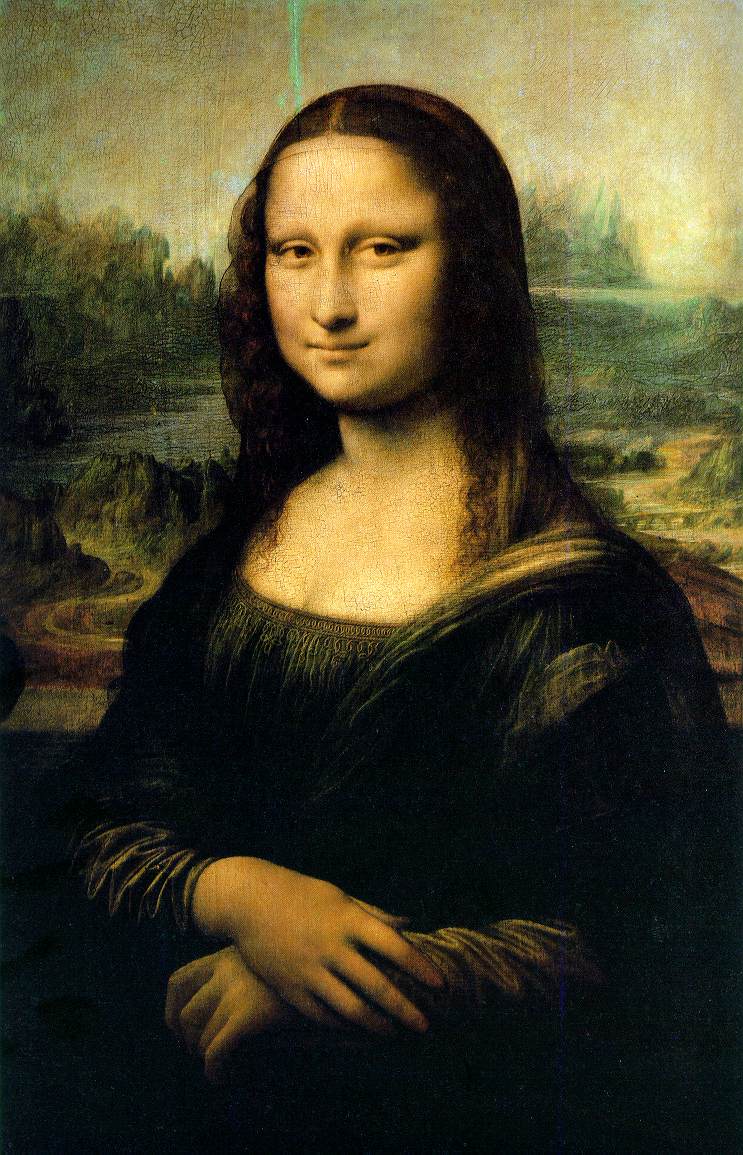
5. Anachronism-

In my opinion, this is an allegory of Christmas. It is showing a "tail" tale of how North America wants more and more and is pushing out of their boundaries which is consuming them in darkness. South America area is content with what they have which is why they are golden.

2. Alliteration-
An angry alligator ate an apple at an airport.
3. Allusion-
4. Ambiguity-
Nobody knows why Mona Lisa is smiling and people have different interpretations of her facial expression.

5. Anachronism-

Friday, January 11, 2013
AP prep post "Siddhartha"
1. If you were the river, would you be enlightenment or would you know enlightenment? In other words, what’s up with the river? What is it’s relation to enlightenment?
2. What does enlightenment look like in Siddhartha? Is it a feeling? An attitude?
3. What purpose does self-denial serve in Siddhartha? What about self-indulgence?http://www.shmoop.com/siddhartha/questions.html
4. Siddhartha features substantial activity and narrative action. At the same time, it is about one man’s largely internal spiritual quest. What is the relationship between the internal and exterior worlds of Siddhartha? How does Siddhartha negotiate these worlds?
5. Herman Hesse’s novels before Siddhartha focused on alienated young men who rejected the cultures of their upbringings. However, these other novels did not feature the spiritual elements of Siddhartha. How do the spiritual elements of Siddhartha make it different from any other story of an alienated youth?
http://danig14.blogspot.com/2013/01/1.html#!/2013/01/1.html
To answer these questions, I would have to completely reread the book. I remember very little of it, but I feel like if I did reread Siddhartha, these questions wouldn't be too hard. I would just have to read it carefully and make sure that I understand it all.
2. What does enlightenment look like in Siddhartha? Is it a feeling? An attitude?
3. What purpose does self-denial serve in Siddhartha? What about self-indulgence?http://www.shmoop.com/siddhartha/questions.html
4. Siddhartha features substantial activity and narrative action. At the same time, it is about one man’s largely internal spiritual quest. What is the relationship between the internal and exterior worlds of Siddhartha? How does Siddhartha negotiate these worlds?
5. Herman Hesse’s novels before Siddhartha focused on alienated young men who rejected the cultures of their upbringings. However, these other novels did not feature the spiritual elements of Siddhartha. How do the spiritual elements of Siddhartha make it different from any other story of an alienated youth?
http://danig14.blogspot.com/2013/01/1.html#!/2013/01/1.html
To answer these questions, I would have to completely reread the book. I remember very little of it, but I feel like if I did reread Siddhartha, these questions wouldn't be too hard. I would just have to read it carefully and make sure that I understand it all.
Wednesday, December 12, 2012
Semester Endgame
- I actually do find myself reading my friend's work online. I like to read their posts to see what ideas they had on the topic that I have to write about. I like seeing the different point of views compared to my own. After every assignment, I check everybody's blog who sits at my table and occasionally some others as well to see what they had to say. Sometimes I will read other people's blogs to see what they have posted that I don't. I also read others blogs for ideas when I am stumped on the topic we are given to write. I like reading others blogs and I feel like if I didn’t understand the reading that well, by looking at how other people viewed the story and their ideas on the topic, it helps me to better understand it as well.
- I think that the always visible course blog has made it different from other courses without a blog because I know that everybody can see my work. Other people in my class can actually benefit from my work by reading what my ideas on a subject are whenever they want. If the blog suddenly disappeared tomorrow, I would feel like all this work that I put into my blog was for nothing. I am tired of the old traditional classroom setting and I would be bummed out if we had to go back to text books and turning in homework.
- Publishing work for the public to see has changed my approach to completing an assignment because I feel like I actually need to know my information before I post something on a topic. Some random person can come across my blog that knows a lot more about a subject than I do and read my perspective on it and think I am a complete idiot. So I find myself putting in extra research to make sure that I have my facts straight. If I couldn’t post my work online, I would actually be kind of relieved. To be honest, I would be able to do the bare minimum to just get my homework turned in or not complete questions that I don’t know. So this is actually kind of a good thing I guess because I have to actually research things that I don’t know and have to complete my post.
- I like how in class all we do is talk about the work that we did online the night before and what we need to do online for the current day. It is a nice break in the day to relax and just discuss what I have already learned. The learning happens at home when i am doing my assignment and looking up information on different websites or reading stories online that I need to answer questions on.
- I would say that seriously it is the learning of the future. Just imagine if the entire country's English classes collaborated online to study for tests. I could have a discussion with somebody over in Florida who has the take the same test as me the next day. I feel like the whole entire country as a whole would do better and have millions of different perspectives behind them when it came to the AP test questions.
- They think that it is pretty interesting. My sister believes that Dr. Preston is onto something here that not many people realize. My mom thinks that it would be cool to talk with other people around the world about a class subject and help each other out.
- They share the same ideas about the class as i do. I feel that in a few years, everything will be online and we might not even need to go to a classroom.
Monday, December 10, 2012
Lit Anal #5
The Color Purple
by Alice Walke
by Alice Walke
1)Summary:
Celie is a poor uneducated girls form rural Georgia. Celie writes letters to God because her father rapes and beats her. Celie gave birth to two children as a result, however her father took both and killed them in the woods. After Celie's mother died, her father married a new woman, but continues to abuse Celie. We soon learn that a man named Mr.____ wants to marry Nettie, Celie's younger more beautiful sister. However, Mr.____ also likes Shug Avery. Celie's father refuses to marry off Nettie to Mr.____ but offers Celie instead. Mr.____ eventually accepts the offer. Nettie runs away form home and takes refuge with Celie at her new home. Mr.____ advances on Nettie, who becomes frightened and runs away never to be seen again. Celie believes she is dead. Shug comes to town to sing at a local bar and Mr.____'s son marries a girl named Sofia. Both the son and father try to abuse Sofia but she is stronger than the to and fights back. Shug falls ill and Mr.____ takes her in forcing Celie to take care of her. Celie starts to become attracted to Shug. Their relationship grows more intimate. Shug and Celie learn that Mr.____ has hidden letters to Celie from Nettie over the years. Celie reads them and wants to kill Mr.____. Nettie became a missionary in Africa with the help of a kind couple. That couple had adopted two children, who look like Nettie. Nettie confesses that they are her sisters children. The wife of the couple dies and Nettie marries the husband. Celie eventually begins to like Mr.____ and starts to enjoy her life. Sofia remarries Mr.____'s son and works in Celie's clothing store. Nettie finally returns home and she and Celie live happily together. They never felt younger.
Celie is a poor uneducated girls form rural Georgia. Celie writes letters to God because her father rapes and beats her. Celie gave birth to two children as a result, however her father took both and killed them in the woods. After Celie's mother died, her father married a new woman, but continues to abuse Celie. We soon learn that a man named Mr.____ wants to marry Nettie, Celie's younger more beautiful sister. However, Mr.____ also likes Shug Avery. Celie's father refuses to marry off Nettie to Mr.____ but offers Celie instead. Mr.____ eventually accepts the offer. Nettie runs away form home and takes refuge with Celie at her new home. Mr.____ advances on Nettie, who becomes frightened and runs away never to be seen again. Celie believes she is dead. Shug comes to town to sing at a local bar and Mr.____'s son marries a girl named Sofia. Both the son and father try to abuse Sofia but she is stronger than the to and fights back. Shug falls ill and Mr.____ takes her in forcing Celie to take care of her. Celie starts to become attracted to Shug. Their relationship grows more intimate. Shug and Celie learn that Mr.____ has hidden letters to Celie from Nettie over the years. Celie reads them and wants to kill Mr.____. Nettie became a missionary in Africa with the help of a kind couple. That couple had adopted two children, who look like Nettie. Nettie confesses that they are her sisters children. The wife of the couple dies and Nettie marries the husband. Celie eventually begins to like Mr.____ and starts to enjoy her life. Sofia remarries Mr.____'s son and works in Celie's clothing store. Nettie finally returns home and she and Celie live happily together. They never felt younger.
2)Theme:
The main theme is that the ability to express one's thoughts and feelings is important to find oneself.
The main theme is that the ability to express one's thoughts and feelings is important to find oneself.
3)Tone:
The tone of the novel is very serious and tragic.
The tone of the novel is very serious and tragic.
4)Literary Elements:
Structure-the novel is written in a first person narrative format.
Symbolism-purple, the color, represents all things created by God that are good.
Syntax-the author writes in short chapters each one a different letter to God written by Celie
Mood-the mood is sad and tragic
Diction-Walker uses words that Celie would have used since she was a poor uneducated girl from Georgia.
Structure-the novel is written in a first person narrative format.
Symbolism-purple, the color, represents all things created by God that are good.
Syntax-the author writes in short chapters each one a different letter to God written by Celie
Mood-the mood is sad and tragic
Diction-Walker uses words that Celie would have used since she was a poor uneducated girl from Georgia.
Monday, November 26, 2012
Lit Anal # 4
The
Things They Carried
by Tim O'Brien
General -
by Tim O'Brien
General -
1.This story follows O'Brien throughout
different parts of his life. It mainly follows events of his
experience in the Vietnam war. It is also important to note that the
novel states it is a work of fiction by Tim O'Brien, that the exact
events of this novel didn't really happen. O'Brien describes the
daily life of Alpha Company in great detail. He mentions the little
things like what each man carried with him when they went out on
patrol. O'Brien then tells us of the first death in Alpha Company.
Ted Lavender a low ranking soldier was shot on his way back from the
bathroom. The book describes him as just dropping dead like a sand
bag hitting the ground. The leader of the group, Lieutenant Jimmy
Cross takes personal responsibility for Ted's death, blaming himself
for not being more focused on the task at hand. Next, O'Brien tells
us of his back round and how he ended up in the war. He was a normal
person, living a normal life, when he got his letter saying he was
drafted. He was confused and afraid, he didn't want to go to war, yet
he didn't want to be a coward. He ran away and made it to the boarder
of Canada where he stayed at a lodge called Tip Top Lodge. While he
was there he became overwhelmed with his guilt that he decides to go
home and to war. O'Brien tells us of another death, this time of Curt
Lemon. Lemon stepped on a rigged mortar round which killed him and
sent his remains all over the tree he was under. Another death
happened when Lee Strunk stepped on a land mine and his legs were
blown off. Strunk and Jensen made a pact to kill one another if the
other was severely injured. However, Strunk begged not to die and
Jensen didn't kill him. Strunk died before he got treatment. The
final death in Vietnam of the company was that of Kiowa. He was a
beloved member of the company and close friends with Tim and Norman
Bowker. Kiowa died when a mortar shell struck the ground near him
when Alpha Company was marching through a "shit field". The
mortar caused a collapse in the field creating a hole which suck
Kiowa head first under the muck. O'Brien explains that he dealt with
the lost while Bowker never got over it. Tim goes on to tell us a
short story of Bowker trying to figure out how to live his life back
in the USA. We are told later that he committed suicide. With all of
this death happening in Alpha Company, Tim recounts his first kill.
It was misty and he was sitting in his fox hole with three grenades
lined up for easy access. He saw a man run around the bend with a
Ak-47, so he threw a grenade at him. Tim explains in great detail the
kill and how he just stared at the man after it happened.
Lastly Tim explains how he was able to cope with all the death easier than everyone else. He tells us that his fourth-grade love died of cancer and that because of this he could deal with the deaths of his company.
Lastly Tim explains how he was able to cope with all the death easier than everyone else. He tells us that his fourth-grade love died of cancer and that because of this he could deal with the deaths of his company.
2. A major theme in this novel is that
of burdens, both physical and mental. The physical burdens of what
the physically carried with them. In the first chapter, when Tim is
describing the things they carried, he gives the weight of each
individual item as well. The mental burdens are that of the deaths of
friends and comrades in arms. How each one of them had to cope with
the deaths and keep their emotions in line else they will die too.
3. The tone is very grim, dark, and
straight to the point.
"The things they carried was largely determined by necessity. Among the necessities or near-necessities were P-38 can openers, pocket knives, heat tabs, wristwatches, dog tags, mosquito repellent, chewing gum, candy, cigarettes, salt tablets, packets of Kool-Aid, lighters, matches, sewing kits, Military Payment Certificates, C rations, and two or three canteens of water. Together, these items weighed between 12 and 18 pounds, depending upon a man's habits or rate of metabolism."
"and there was a puff of dust and smoke- a small white puff- and the young man seemed to jerk upward as if pulled by invisible wires. He fell on his back. His rubber sandals had been blown off. He lay at the center of the trail, his right leg bent beneath him, his one eye shut, his other eye a huge star-shaped hole."
"I watched Lemon turn sideways. He laughed and said something to Rat Kiley. Then he took a peculiar half step, moving from the shade into the bright sunlight., and the booby-trapped 105 round blew him into a tree. The parts were just hanging there, so Dave Jensen and I were ordered to shinny up and peel him off. I remember the white bone of an arm. I remember pieces of skin and something wet and yellow that must have been his intestines. The gore was horrible, and stays with me. But what wakes me up twenty years later is Dave Jensen singing "Lemon Tree" as we threw down the parts."
"The things they carried was largely determined by necessity. Among the necessities or near-necessities were P-38 can openers, pocket knives, heat tabs, wristwatches, dog tags, mosquito repellent, chewing gum, candy, cigarettes, salt tablets, packets of Kool-Aid, lighters, matches, sewing kits, Military Payment Certificates, C rations, and two or three canteens of water. Together, these items weighed between 12 and 18 pounds, depending upon a man's habits or rate of metabolism."
"and there was a puff of dust and smoke- a small white puff- and the young man seemed to jerk upward as if pulled by invisible wires. He fell on his back. His rubber sandals had been blown off. He lay at the center of the trail, his right leg bent beneath him, his one eye shut, his other eye a huge star-shaped hole."
"I watched Lemon turn sideways. He laughed and said something to Rat Kiley. Then he took a peculiar half step, moving from the shade into the bright sunlight., and the booby-trapped 105 round blew him into a tree. The parts were just hanging there, so Dave Jensen and I were ordered to shinny up and peel him off. I remember the white bone of an arm. I remember pieces of skin and something wet and yellow that must have been his intestines. The gore was horrible, and stays with me. But what wakes me up twenty years later is Dave Jensen singing "Lemon Tree" as we threw down the parts."
4. Syntax-O'Brien writes in a very
matter of fact type style but he adds more descriptions and
detail.
"On the third day, Curt Lemon stepped on a booby-trapped 105 round. He was playing catch with Rat Kiley, laughing and then he was dead. The trees were thick; took nearly an hour to cut an LZ for dustoff."
Diction-O'Brien uses military language and words in the novel
Mood-the novel is grim and dark, as well as, morbid.
Structure-the novel is a first person narrative, also, it is a fiction auto-biography.
Symbolism-The "things" that the men carried were not only their physical burdens but the emotional and mental burdens, this ties in with the main theme.
"On the third day, Curt Lemon stepped on a booby-trapped 105 round. He was playing catch with Rat Kiley, laughing and then he was dead. The trees were thick; took nearly an hour to cut an LZ for dustoff."
Diction-O'Brien uses military language and words in the novel
Mood-the novel is grim and dark, as well as, morbid.
Structure-the novel is a first person narrative, also, it is a fiction auto-biography.
Symbolism-The "things" that the men carried were not only their physical burdens but the emotional and mental burdens, this ties in with the main theme.
Characterization-
1.Indirect characterization- “He
would look them in the eyes, keeping his chin level, and he would
issue the new SOP's in a calm, impersonal tone of voice, an officer's
voice, leaving no room for argument or discussion"
This shows what kind of a leader Cross
was. It shows that he was heartbroken by the loss of one of his men.
Direct characterization- The story uses
direct characterization when it explains how characters feel about
other characters.
2. The book is a first person
narrative. He tells the story from his point of view. His diction
doesn't really change because he always views them the same way. He
changes the way they talk depending on who the character is or where
they came from to help us get a feel for the different characters.
3. He tells his story as if it already
happened. So he is static, however in the events that he tells about,
he is dynamic. There is a part where he throws a grenade and blows a
guy up. He becomes depressed at that point and it changes his
character.
4. I felt like I met a person because
it was the story of his life, so I felt like I really got to know him
and his emotions.
Subscribe to:
Posts (Atom)